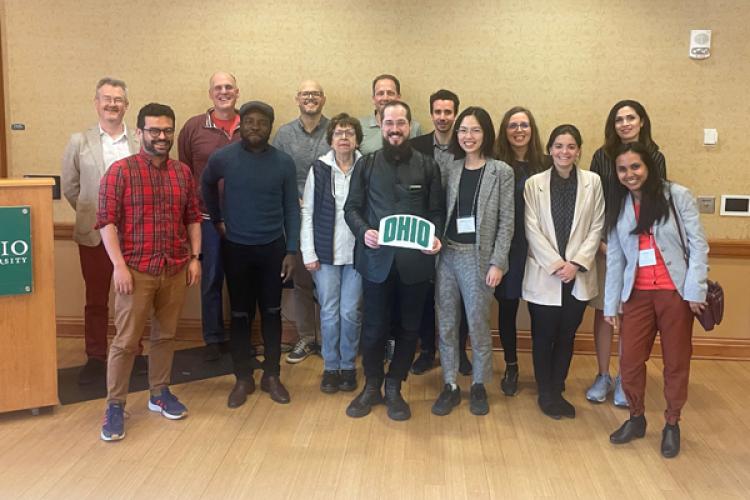
History of Capitalism Conference calls for re-evaluating benefits of informal economies

The History of Capitalism Conference, hosted by the Menard Family George Washington Forum, brought together scholars working in entrepreneurship and informal economies from across the globe to discuss "Capitalism and Informality" on April 14 and 15 at Ohio University.
Informal economic activity arises when formal institutions fail to promote well-being and fail to protect social welfare against the interests of power holders in government and business, explained Cort Rodet, associate professor of economics in the College of Arts and Sciences and forum director.
The conference examined the persistence of informal economies and their relationship with economic transformation, exploring how informal economies have developed complex organizational structures, have co-evolved in tandem with new industries and modes of production, and have shaped the broader economic and social contexts in which they are embedded.
"A major takeaway from the conference was a consensus calling for a reevaluation of the implicit presumption that entrepreneurship within the bounds of formal institutions (e.g., abiding by licensing regulations and paying local taxes) is always better for the entrepreneur and for their community," Rodet said.
More than a half-century of developmental discourse has portrayed informality as a signal of economic weakness. From the writings of Max Weber to those of Clifford Geertz, Keith Hart, and Alfred Chandler, social scientific theories have suggested that as economies modernize, hierarchical and rationalized forms of economic organization will displace the “unorganized, unincorporated enterprises” and anomic agents of the informal economy.
Contrary to such predictions, informality remains the global norm. The informal economy continues to comprise at least half of all enterprises, a sizable majority of all jobs, and as much as 20 percent of gross domestic product in developed economies and 60 percent in emerging markets.
"Entrepreneurs often operate within the informal economy because the formal institutions (e.g., constitutions, ordinances, and laws) in their community do not provide a rule of law that supports justice, fairness, or opportunity to exercise creativity," Rodet said.
"There is no ‘one-size-fits-all’ solution to improving formal institutions, but by examining the entrepreneurial processes in the informal economy, we gain insight into how local conditions can be improved to unleash entrepreneurial creativity and innovation. Furthermore, if formal institutions have a sense of legitimacy and work for the interest of the community, a positive feedback loop arises where community members work to support the rule of law," Rodet said.
Conference participants came from a variety of disciplines:
- Economists Rob Ackrill of Nottingham Trent University, Vincent Carret of Duke University, Eghosa Igudia of De Montfort University, and Maria Minniti of Syracuse University
- Historians Adam Frost of the Copenhagen Business School and David Kirsch of the University of Maryland
- Anthropologists Shuang Lu Frost of Aarhus University and Ipshita Ghosh of the University of North Carolina at Charlotte
- Communication scholar Fabian Prieto-Nanez of Virginia Tech
- Entrepreneurship scholars Jorge Arteaga of Oklahoma State University, Richard Hunt of Virginia Tech, Marta Marin of the University of Maryland, Judy Rady of Virginia Tech, Ester Salvi of the Technical University of Munich School of Management, and Justin Webb, UNC Charlotte
This conference will be followed by a subsequent special journal issue examining capitalism and informality.
